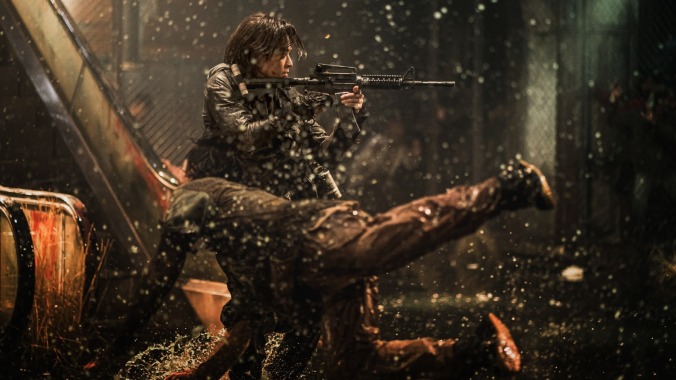It isn’t often that a movie mines truly fresh horror from an exhausted trope. Yet with his 2016 thrill ride Train To Busan, South Korean writer-director Yeon Sang-ho elevated the moribund walking-dead genre with striking imagery, a cramped setting, and some blood-splattered insight into how humans evolve under crisis. What’s more, he did so without really reinventing the wheel: Though we’ve seen plenty of zombie movies looking to indict humanity’s fickle morality, few have matched the heart and intelligence of Yeon’s, which was powered by a whole passenger’s car worth of engaging characters and the potent charm of the actors bringing them to life.
Aside from the sea of formidable undead and at least one cutthroat businessman, Train To Busan’s greatest, now all-too-familiar source of distress was the uncertainty of a quickly spreading epidemic. Train To Busan Presents: Peninsula doesn’t make any attempt to replicate that brand of anxiety as it jumps four years into the now-pandemic. Unfortunately, the film doesn’t find a terrifying substitute for it, either. Yeon, who returns to direct and co-write this sequel, instead leans heavily on CGI and an inexplicable heist plot—sufficiently entertaining qualities that nevertheless fail to compensate for the film’s failings, including a thin premise, largely forgettable characters (no one from the last film returns in this standalone follow-up), and an absence of the emotional heft the original so refreshingly provided.
Peninsula’s prologue yanks audiences back to the beginning of the epidemic. Soldier Jung-seok (Gang Dong-won) escorts his sister and her young son to a ferry bound for the nearest safe haven, Japan. Little time passes before the sister is predictably fridged—and her kid killed, too—by an infected passenger; Jung-seok and his brother-in-law, Chul-min (Kim Do-yoon), barely escape the cabin alive. When we meet the pair again in a survivors’ hub in Hong Kong, years have passed, and the military man is a somber shell of his former self, burdened by survivor’s guilt. Any faith a viewer might have that he’ll rediscover his zeal for life—or anything that might make him look more lively than the zombies on his tail—would be gravely misplaced. This is who the guy is now, and it’s boring.
Still, Jung-seok must harbor some will to survive, as he and Chul-min agree to assist a suspicious American looking to locate an abandoned truck full of millions of dollars, which he promises to split with whoever successfully recovers the cash from zombie-infested Incheon. The two men, whose relationship has grown tense, team up with two other Korean refugees and journey into a city that’s become a death trap. Unfortunately for them, Yeon exacerbates the mission with contrived obstacles. For instance, there’s the scene where one member of the team makes the baffling decision to lean over an ostensibly lifeless corpse in the tight confines of a car, only to discover that, sure enough, the body isn’t really lifeless and has soon attracted some similarly insatiable company. It’s a small detail that betrays Peninsula’s clumsy stabs at building suspense, all much less clever than the original’s.
Jung-seok squeaks out of that predicament, but the rest of his journey barely resonates; it adheres to a very paint-by-numbers approach to wasteland lore, including the introduction of a Mad Max-ian militia, a gladiatorial battle arena (with zombies, of course), and a fearless single mother (Lee Jung-Hyun) whose scrappy family helps our hero navigate the dilapidated wasteland. Peninsula marches towards its unremarkable ending rather slowly—particularly for a film featuring hordes of sprinting ghouls!
Yeon does maintain his eye for visually arresting moments, such as one that bathes Tetris’d holding containers of zombies in silvery moonlight. And the car chases—some shot from wheel level—provide necessary, intermittent zips of excitement. But while the first Train To Busan was an affecting, character-driven tale of grief and redemption, Peninsula flounders in generic spectacle. Even fans may wonder if there are any bones left to pick on this franchise.










































